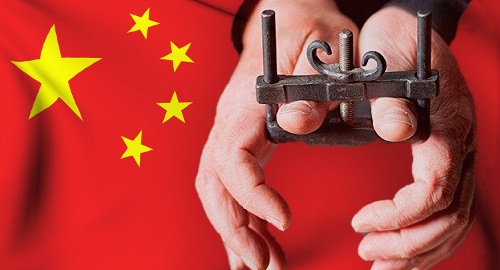
- Online Gambling Laws In China
- Gambling Illegal In China
- Is Gambling Illegal In China
- Illegal Gambling Chinatown Nyc
- Gambling Legal In China
- Why Is Gambling Illegal In China
- Is Gambling Illegal In China
China currently has one of the harshest stances on gambling of any country in the world. The current situation makes gambling and online gamlbing illegal but that doesn't stop residents.
Gambling in China is illegal, but is common over the internet or behind closed doors Credit: Photo: Getty Images Ma Honggang was once a legend in the secretive, twilight world of China's high.
Gambling is illegal in the sense that organized gambling operations are illegal. Chinese gamble with each other all the time. Relatives get together every holiday and play Mahjong with each other for money. I regularly see old people gambling in the park. Now operating a Mahjong den or a poker game with a rake would not be a good idea. Gambling in the People's Republic of China (PRC) is illegal, with the exception of Macau, Hong Kong and Taiwan. The key legislation regulating gambling is Article 303 of the Criminal Law of the PRC (Criminal Law) (as amended in 1997) and the Sixth Amendment to the Criminal Law, which provides that.
All online gambling is supplied by overseas providers who use various different tricks and tactics to get around the Chinese government blocking them. The best betting site for Chinese customers is listed below:
Best Chinese Betting Site:
Key Facts: Online Gambling In Brazil
- State sponsored Welfare Lottery and Sports Lottery technically legal.
- All other forms of gambling illegal.
- Residents have faced punishments for gambling online, although not severe.
- Government attempt to block websites of all overseas providers.
- Operators constantly change URL or site so Chinese people can still access.
Gambling Laws In China: Legal or Illegal?
In its current guise, the Chinese state was established in 1949 and as such the story of Chinese gambling legislation also essentially starts there. The following timeline details the major landmarks in legislation which have shaped the Chinese gambling industry in the ensuing seven decades:
1949 – Blanket Ban
The People's Republic of China was established under the leadership of Mao Zedong in 1949. Zedong considered gambling to be one of the greatest ills of a socialist society and imposed a blanket ban on all such activities.
1957 – Re-Education Through Labour Program
It was in 1957 that the Chinese state's ‘re-education through labour program' which to this day is still used to punish some gambling offences was established. The sentencing under that program is undertaken by a special committee under police authority and success in appealing any sentence laid down is almost unheard of.
Online Gambling Laws In China
1987 – China Welfare Lottery
Following Mao Zedong's death in 1976, some of his more restrictive policies began to be slowly relaxed.
This eventually led to the establishment of the China Welfare Lottery in 1987 as the first form of legalised gambling in the country.
1994 – China Sports Lottery
Some seven years after the establishment of the Welfare Lottery, China's Sports Lottery Administration Centre was set up.
This organisation offered the first legalised sports betting within China and to this day still operates as a state sponsored monopoly in that area.
1997 – Article 303 of the Criminal Law of the People's Republic of China
In 1997 there was a revision of the Criminal Law of the People's Republic of China, which included Article 303 as follows;
Gambling Illegal In China
Whoever, for the purpose of profit, gathers people to engage in gambling, runs a gambling house or makes gambling his profession shall be sentenced to fixed-term imprisonment of not more than three years, criminal detention or public surveillance and shall also be fined.
Whilst that article seems to place the focus solely upon professional gambling, Chinese authorities do still routinely pursue casual gamblers. Where this is less apparent – but still by no means untrue – is in the case of online gambling where providers are certainly more actively targeted than users.

Tax On Winnings?
As we have described in detail above, the vast majority of gambling is illegal in China. As such, the only forms of gambling which could be subject to taxation are those offered by the two state sponsored lotteries.
Is Gambling Illegal In China
When it does come to those lotteries, winnings worth less than RMB 10,000 are not subject to taxation, whereas winnings above that threshold are subject to a flat rate of 20% income tax.

Any winnings from offshore gambling sites are essentially tax free.
Deposit Methods: What Works?
Online gambling is illegal in China and there are no Chinese based providers who are sanctioned by the Chinese government. Overseas providers, too, are routinely blocked by Chinese authorities and citizens using them can be punished through the country's ‘re-education through labour program'.
Huge numbers of Chinese citizens, however, do still gamble online and a great many of the world's biggest online providers do still cater for the Chinese market.

- Online Gambling Laws In China
- Gambling Illegal In China
- Is Gambling Illegal In China
- Illegal Gambling Chinatown Nyc
- Gambling Legal In China
- Why Is Gambling Illegal In China
- Is Gambling Illegal In China
China currently has one of the harshest stances on gambling of any country in the world. The current situation makes gambling and online gamlbing illegal but that doesn't stop residents.
Gambling in China is illegal, but is common over the internet or behind closed doors Credit: Photo: Getty Images Ma Honggang was once a legend in the secretive, twilight world of China's high.
Gambling is illegal in the sense that organized gambling operations are illegal. Chinese gamble with each other all the time. Relatives get together every holiday and play Mahjong with each other for money. I regularly see old people gambling in the park. Now operating a Mahjong den or a poker game with a rake would not be a good idea. Gambling in the People's Republic of China (PRC) is illegal, with the exception of Macau, Hong Kong and Taiwan. The key legislation regulating gambling is Article 303 of the Criminal Law of the PRC (Criminal Law) (as amended in 1997) and the Sixth Amendment to the Criminal Law, which provides that.
All online gambling is supplied by overseas providers who use various different tricks and tactics to get around the Chinese government blocking them. The best betting site for Chinese customers is listed below:
Best Chinese Betting Site:
Key Facts: Online Gambling In Brazil
- State sponsored Welfare Lottery and Sports Lottery technically legal.
- All other forms of gambling illegal.
- Residents have faced punishments for gambling online, although not severe.
- Government attempt to block websites of all overseas providers.
- Operators constantly change URL or site so Chinese people can still access.
Gambling Laws In China: Legal or Illegal?
In its current guise, the Chinese state was established in 1949 and as such the story of Chinese gambling legislation also essentially starts there. The following timeline details the major landmarks in legislation which have shaped the Chinese gambling industry in the ensuing seven decades:
1949 – Blanket Ban
The People's Republic of China was established under the leadership of Mao Zedong in 1949. Zedong considered gambling to be one of the greatest ills of a socialist society and imposed a blanket ban on all such activities.
1957 – Re-Education Through Labour Program
It was in 1957 that the Chinese state's ‘re-education through labour program' which to this day is still used to punish some gambling offences was established. The sentencing under that program is undertaken by a special committee under police authority and success in appealing any sentence laid down is almost unheard of.
Online Gambling Laws In China
1987 – China Welfare Lottery
Following Mao Zedong's death in 1976, some of his more restrictive policies began to be slowly relaxed.
This eventually led to the establishment of the China Welfare Lottery in 1987 as the first form of legalised gambling in the country.
1994 – China Sports Lottery
Some seven years after the establishment of the Welfare Lottery, China's Sports Lottery Administration Centre was set up.
This organisation offered the first legalised sports betting within China and to this day still operates as a state sponsored monopoly in that area.
1997 – Article 303 of the Criminal Law of the People's Republic of China
In 1997 there was a revision of the Criminal Law of the People's Republic of China, which included Article 303 as follows;
Gambling Illegal In China
Whoever, for the purpose of profit, gathers people to engage in gambling, runs a gambling house or makes gambling his profession shall be sentenced to fixed-term imprisonment of not more than three years, criminal detention or public surveillance and shall also be fined.
Whilst that article seems to place the focus solely upon professional gambling, Chinese authorities do still routinely pursue casual gamblers. Where this is less apparent – but still by no means untrue – is in the case of online gambling where providers are certainly more actively targeted than users.
Tax On Winnings?
As we have described in detail above, the vast majority of gambling is illegal in China. As such, the only forms of gambling which could be subject to taxation are those offered by the two state sponsored lotteries.
Is Gambling Illegal In China
When it does come to those lotteries, winnings worth less than RMB 10,000 are not subject to taxation, whereas winnings above that threshold are subject to a flat rate of 20% income tax.
Any winnings from offshore gambling sites are essentially tax free.
Deposit Methods: What Works?
Online gambling is illegal in China and there are no Chinese based providers who are sanctioned by the Chinese government. Overseas providers, too, are routinely blocked by Chinese authorities and citizens using them can be punished through the country's ‘re-education through labour program'.
Huge numbers of Chinese citizens, however, do still gamble online and a great many of the world's biggest online providers do still cater for the Chinese market.
When it comes to depositing to these sites, therefore, Chinese punters tend to prefer methods which provide a kind of shield between the site and their bank account. Some e-wallet services, for instance, often make it more difficult to determine where money is being deposited or where any withdrawals have come from.
However by far the easiest and most widely successful deposit is Unionpay.
It's no surprise that gambling was first recorded in China. Like the cross bow, gunpowder, the potter's wheel, and toilet paper, the first betting and lottery games came out of the Middle Kingdom. Games like keno, mahjong, and paijiu were played back as far as Shang Dynasty, and through the centuries the Chinese concocted ways to bet on nearly everything, from horse races to cricket fights. Today, many of these games continue being played and gambling is still a dynamic part of Chinese culture.
Though gambling is technically illegal in China, but the laws are not applied to 'friendly games,' which means informal gambling in private residences. You can see them in the streets, in homes, in markets and in the parks of China: people sitting around small tables seriously playing tile or domino games. Mahjong and Paijiu are traditionally gambling games, though today they can be played with or without money this does not mean that the gambling culture here has gone dormant. To the contrary, gambling is still a vibrant part of Chinese culture, and can be seen daily in the country. It is even a popular activity during weddings, funerals, the New Year festivities, and the old are encouraged to partake in gambling to keep their minds alert and nimble.
Maybe it'll help. By default you have to choose from the existing list of slots. But you can add slot by right-clicking at you object in the list at right side of designer and choose 'slot/signals' and add your custom slot/signal. After that, you can choose it in signal/slot editor. As the title saiz. This has been a problem in past (2012) and the attached link does not really provide solution. This is a first attempt to work with signal / slot AFTER I reinstalled my Qt Creator. Since I am adding a slot in 'device.cpp' I do not g. In Qt Designer 's signals and slots editing mode, you can connect objects in a form together using Qt's signals and slots mechanism. Both widgets and layouts can be connected via an intuitive connection interface, using the menu of compatible signals and slots provided by Qt Designer. Add slot in qt designer. Adding a custom slot in Qt Designer and Visual Studio 2012 I was going through the 'Getting started' section for Qt using VS2012 as my IDE, and I got stuck when I had to add a slot to a button. Apparently there is a bug when using the Visual Studio add-in, that the submenu Go to slot doesn't show up in a context menu in Qt Designer (see bug).
Many Asians — especially Chinese — consider gambling an accepted practice at home and at social events, even among the young. Chinese youths often gamble for money with aunts, uncles and grandparents. –Asian Nation
Illegal Gambling Chinatown Nyc
From traveling and living in China, from reading extensive amounts of Chinese literature, it is clear that gambling is more extensively practiced here than perhaps anywhere else in the world.
With over 450 million users, China has the largest online community in the world. This, combined with the rise in expendable income and the cultural inclination towards gambling, online casinos marketed to Chinese users have been popping up with rapid frequency. Through a loophole in the legal system, online gambling is only illegal in China if it's through a site that's hosted in China. Though the government censors may block popular gaming sites in China, just about everyone here knows how to subvert their control.
Gambling Legal In China
There is only one place in China where you can find legal brick and mortar casinos, and that's Macau. After taking the colony over from Portugal in 1999, there was little question about what the Chinese authorities would do with gambling. Like everything else in the country, they developed it. Today, Macau casinos rake in more money than Vegas.
Why Is Gambling Illegal In China
So why is gambling so widespread in China? In their work entitled, Examination of Chinese Gambling Problems through a Socio-Historical-Cultural Perspective, professors Samson Tse,*, Alex C.H. Yu, Fiona Rossen, and Chong-Wen Wang suggest:
Is Gambling Illegal In China
'. . . to examine Chinese gambling successfully would require us to look beyond Chinese history. An increasing volume of studies has suggested that the Chinese tend to have a higher external locus of control than their Western counterparts regardless whether the research participants were university students or clients presenting to problem gambling services. The higher external locus of control has a potential to lead to a higher illusion of control and distorted thinking, and may increase an individual's level of participation in gambling. If the gambler wins a lot of money, it will affirm the belief that he/she is destined to be a winner. However, if the person loses money, he/she would say, 'One day my turn will come.' . . . Locus of control may explain why social gambling is a very common activity among Chinese societies. Superstition is another factor, indeed, that may increase the propensity for excessive gambling. Many Chinese believe that one's success and wealth depends on fate, luck, Feng Shui (certain architectural styles that could affect one's fortune), and/or accumulation of good deeds. According to the Analects of Confucius, life and death are a matter of fate; riches and poverty depend on heaven.'
Though it's my impression that they gamble for the obvious reasons: the stimulation, the community cohesion, the thrill, and, of course, the simple fun of it.